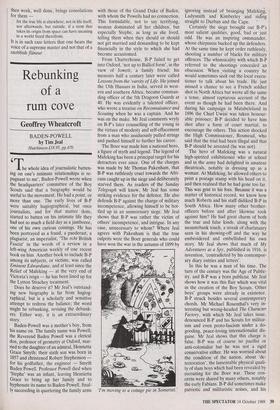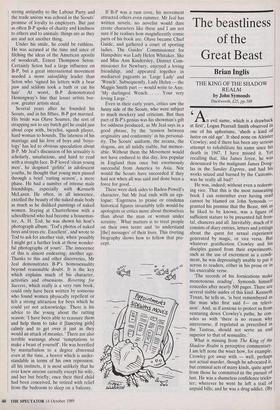Rebunking of a rum cove
Geoffrey Wheatcroft
BADEN-POWELL by Tim Jeal
Hutchinson £18.95, pp.670
The whole idea of journalistic batten- ing on one's intimate relationships is re- pugnant to me', Baden-Powell wrote when the headquarters' committee of the Boy Scouts said that a biography would be useful to the movement. He had a point, or more than one. The early lives of B-P were suitably hagiographical, but once journalists, and for that matter dons, started to batten on his intimate life they had not so much a field day as a jamboree, one of his own curious coMings. He has been portrayed as a fraud, a paederast, a plagiarist, an imperialist, 'The echt British Fascist' in the words of a review in a left-wing American weekly of one recent book on him. Another book to include B-P among its subjects, or victims, was called Eminent Edwardians, and at least since the Relief of Mafeking — at the very end of Victoria's reign — he has been lined up for the Lytton Strachey treatment.
Does he deserve it? Mr Jeal's outstand- ing new biography is far from hagiog- raphical, but is a scholarly and sensitive attempt to redress the balance; the word might be rebunking, revising the debunk- ers. Either way, it is an extraordinary story.
Baden-Powell was a mother's boy, from his name on. The family name was Powell; the Reverend Baden Powell was a clerical don, professor of geometry at Oxford, mar- ried to the daughter of an admiral, Henrietta Grace Smyth; their sixth son was born in 1857 and christened Robert Stephenson for his godfather, the engineer — Smyth Baden Powell. Professor Powell died when `Stephe' was an infant, leaving Henrietta Grace to bring up her family and to hyphenate its name to Baden-Powell, final- ly succeeding in quartering the family arms with those of the Grand Duke of Baden, with whom the Powells had no connection. This formidable, not to say terrifying, woman dominated all her children, but especially Stephe, as long as she lived, telling them when they should or should not get married and demanding to be kept financially in the style to which she had become accustomed.
From Charterhouse, B-P failed to get into Oxford, 'not up to Balliol form', in the view of Jowett, a family friend; his memoirs half a century later were called Lessons from the 'varsity of Life. He joined the 13th Hussars in India, served in west- ern and southern Africa, became comman- ding officer of the 5th Dragoon Guards at 40. He was evidently a talented officer, who wrote a treatise on Reconnaisance and Scouting when he was a captain. And he was on the make. Mr Jeal comments wryly on B-P's later counselling of the young in the virtues of modesty and self-effacement from a man who assiduously pulled strings and pushed himself to further his career.
The Boer war made him a national hero, a figure of myth and legend. The legend of Mafeking has been a principal target for his detractors ever since. One of the charges was made by Mr Thomas Pakenham, that B-P was ruthlessly cruel towards the Afri- cans caught up in the siege and deliberately starved them. As readers of the Sunday Telegraph will know, Mr Jeal has some striking evidence for the defence. He also defends B-P against the charge of military incompetence, allowing himself to be bot- tled up in an unnecessary siege. Mr Jeal shows that B-P was rather the victim of others' incompetence, and intrigue. In any case, unnecessary to whom? Where Jeal agrees with Pakenham is that the true culprits were the Boer generals who could have won the war in the autumn of 1899 by 'I m moving to a cottage pie in Somerset.' ignoring instead of besieging IVIafekini, Ladysmith and Kimberley and riding straight to Durban and the Cape. "
Certainly the siege brought out B-P's most salient qualities, good, bad or just odd. He was an inspiring commander, whose chirpiness bucked up the defenders. At the same time he kept order ruthlessly, shooting a number of blacks for military offences. The whimsicality with which B-P referred to the shootings concealed an obsession. When visiting a country he would sometimes seek out the local execu- tioner to talk about his trade. He just missed a chance to see a French soldier shot in North Africa but wrote all the same a tense, almost rapturous account of the event as though he had been there. And during his campaign in Matabeleland in 1896 the Chief Uwini was taken honour- able prisoner; B-P decided to have him shot after a form of court martial, to encourage the others. This action shocked the High Commissioner, Rosmead, who said that the trial had been illegal and that B-P should be arrested (he was not).
The hero of Mafeking was a natural high-spirited exhibitionist who at school and in the army had delighted in amateur theatricals, notably in dressing up as a woman. At Mafeking, he allowed others to print a postage stamp with his head on it, and then realised that he had gone too far. This was grist to his foes. Because it was a matter of historical record, we know how much. Roberts and his staff disliked B-P in South Africa. How many other brother- officers before and after likewise took against him? He had great charm of both the true and false kinds, along with the mountebank touch, a streak of charlatanry seen in his showing-off and the way he embroidered and embellished his own story. Mr Jeal shows that much of My Adventures as a Spy, published in 1916, is invention, 'contradicted by his contempor- ary diary entries and letters'.
In this he was a man of his time. The turn of the century was the Age of Public- ity, and B-P was a born publicist. Mr Jeal shows how it was this flair which was vital in the creation of the Boy Scouts. Other boys' groups were already in existence. B-P struck besides several contemporary chords. Mr Michael Rosenthal's very in- teresting but wrong-headed The Character Factory, with which Mr Jeal takes issue, denounced B-P and his Scouts for militar- ism and even proto-fascism under a do- gooding, peace-loving internationalist dis- guise. Mr Jeal shows that this charge is false. B-P was of course no pacifist or anti-colonialist but he was not a rigid conservative either. He was worried about the condition of the nation, about 'de- terioration', the lamentable physical quali- ty of slum boys which had been revealed by recruiting for the Boer war. These con- cerns were shared by many others, notably the early Fabians. B-P did sometimes make patriotic and militaristic noises, and his strong antipathy to the Labour Party and the trade unions was echoed in the Scouts' promise of loyalty to employers. But just as often B-P spoke of charity and kindness to others and to animals: things are as they are and not another thing.
Under his smile, he could be ruthless. He was accused at the time and since of filching the ideas of the American apostle of woodcraft, Ernest Thompson Seton. Certainly Seton had a large influence on B-P, but a great international movement needed a more salonfahig leader than Seton who 'signed his letters with a bear paw and seldom took a bath or cut his hair'. At worst, B-P demonstrated Hemingway's line that lesser artists bor- row, greater artists steal.
Several years after he founded his Scouts, and in his fifties, B-P got married. His bride was Olave Soames, the sort of strapping not to say butch girl he could just about cope with, bicyclist, squash player, hard woman to hounds. The lateness of his marriage and his love of boys and toyo- logy' has led to obvious speculation about B-P. Mr Jeal's discussion of his sexuality is scholarly, unsalacious, and hard to read with a straight face. B-P loved 'clean young men', he despised `girlitis' in adolescent youths, he thought that young men passed through a brief 'rutting season', a mere phase. He had a number of intense male friendships, especially with /Kenneth McLaren. He often, in all innocence, extolled the beauty of the naked male body as much as he disliked paintings of naked women. Staying at Charterhouse with a schoolfriend who had become a housemas- ter, A. H. Tod, he was shown his host's photograph album: Tod's photos of naked boys and trees etc. Excellent', and wrote to Tod to ask for another visit, when 'possibly I might get a further look at those wonder- ful photographs of yours'. The innocence of this is almost endearing; another age. Thanks to this and other discoveries, Mr Jeal demonstrates B-P's homosexuality beyond reasonable doubt. It is the key which explains much of his character, activities and obsessions. Rovering for Success, which really is a very rum book, could only have been written by someone who found women physically repellent or felt a strong attraction for boys which he could yet not acknowledge. There is his advice to the young about the rutting season: 'I have been able to reassure them and help them to take it [fancying girls] calmly and to get over it just as they would an attack of measles.' There are also terrible warnings about 'temptations to make a beast of yourself. He was horrified by masturbation to a degree abnormal even at the time, a horror which is under- standable in terms of his own repression. all his instincts, it is most unlikely that he ever knew anyone carnally except his wife, and her but briefly; once their third child had been conceived, he retired with relief from the bedroom to sleep on a balcony. If B-P was a rum cove, his movement attracted others even rummer. Mr Jeal has written novels; no novelist would dare create characters like these and I am not sure if he realises how magnificently comic parts of his book are Olave became Chief Guide, and gathered a court of sporting ladies. The Guides' Commissioner for Hampshire was Lady Helen Whitaker. She and Miss Ann Kindersley, District Com- missioner for Newbury, enjoyed a loving friendship, and appeared together in mediaeval pageants as 'Liege Lady' and `Wench'. Subsequently, Lady Helen — the Maggie Smith part — would write to Ann: `My darlingest Wench. . . . Your very loving Liege.'
Even in their early years, critics saw the funny side of the Scouts, who were subject to much mockery and criticism. But then part of B-P's genius was his showman's gift for oddness produced, as Mr Jeal says in a good phrase, by the 'tension between originality and conformity' in his personal- ity. The Scouts' uniform, the arcana, the slogans, are all mildly risible, but memor- able. Without them the Movement would not have endured to this day, less popular in England than once but enormously successful from America to Asia. NOr would the Scouts have succeeded if they had not when all was said and done been a force for good.
There were dark sides to Baden-Powell's character, but Mr Jeal ends with an epi- logue: 'Eagerness to praise or condemn historical figures invariably tells would-be apologists or critics more about themselves than about the man or woman under scrutiny.' What matters is to treat people on their own terms and `to understand [the] messages' of their lives. This riveting biography shows how to follow that pre- cept.



























































 Previous page
Previous page